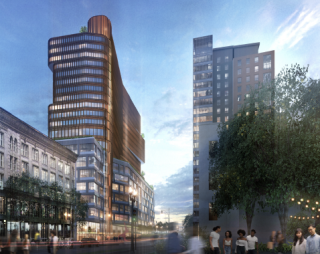
Boston Globe
Labs and apartments could be coming to the southern edge of downtown Boston
Jon Chesto, 3.16.22
A joint venture of two New York-based developers, Peebles Corp. and Genesis Cos., has won the rights to build a tower on state-owned land along Kneeland Street on the edge of Chinatown, overlooking the entrance to the O’Neill Tunnel.
The Massachusetts Department of Transportation board voted on Wednesday to approve the Peebles- Genesis bid, following a year-long contest that initially drew six bidders interested in the 1.4-acre site, known as “Parcel 25.” This marked the first time that MassDOT used the so-called “Massport Model,” in which the diversity of bidders counted toward 25 percent of scoring, to pick a developer for a surplus site. In this case, both Peebles and Genesis are Black-owned firms.
Price was also a factor in the Kneeland Street competition, though it was weighted equally with diversity in the judging, and state officials said the highest bidder did not win. The Peebles-Genesis venture, which aims to build labs and apartments, agreed to provide an upfront payment of $61.5 million to MassDOT, and then pay an annual base rent of $1 million a year for the 99-year ground lease, escalating by 2.5 percent annually.
The deal represents the biggest upfront payment ever for a surplus MassDOT parcel, and the state could receive more than $500 million over the life of the lease. The state weighed two other factors as well —the team’s proven ability to execute and the vision for design and public realm improvements — with each of the four criteria counting for 25 percent of scoring.
Scott Bosworth, the state’s transportation undersecretary, said the agency typically has picked projects in the past that offered the “highest paying reputable bid.” This time, MassDOT tried a different approach, one that has been used by Massport to develop some of its Seaport land.
“This is MassDOT’s effort to really, truly be part of the community, to be cognizant of the neighbors, and frankly to introduce minority-owned firms into our programs, and have our partners look more like today’s society,” Bosworth told the board.
The Peebles-Genesis venture’s 585,000-square-foot proposal consists of 309,000 square feet of lab and research space, 218 apartments above the labs, ground-floor retail, and 121 parking spots. About 40 percent of the apartments would be income-restricted. The 21-story project would cap a portal to the Interstate 93 tunnel, essentially extend the Rose Kennedy Greenway, and decommission an aging city pump station while improving the area’s high-pressure hydrant network. The project will need approval by the Boston Planning & Development Agency, and Peebles hopes to start construction in early 2024, to be finished in mid-2026.
“We thought it was a very bold step by Governor [Charlie] Baker and his administration to value economic inclusion at the level they did in this submission,” said Peebles chairman and chief executive Don Peebles. “We feel the economic inclusion and affordable housing are addressing two of the most pressing issues in the commonwealth.”
Peebles, which also has a corporate office in Miami, is already familiar to MassDOT because it has the rights to build a different project over the Massachusetts Turnpike at the corner of Massachusetts Ave. and Boylston Street in the Back Bay; those plans had been stalled and are being refined to address community concerns about height there.
Finding a bidder for the Kneeland Street site hasn’t been easy, despite its prime location near South Station, I-93, and the Mass. Turnpike. This lot, left over from the Big Dig days, was previously put out to bid about six years ago as part of 5.5 acres that included a neighboring steam plant and a MassDOT office building. That bidding was complicated by the need to incorporate the steam plant — currently operated by Vicinity Energy — and relocate the MassDOT office workers, and ultimately no bids were submitted. Before that, the site had also been considered for a new school but those plans fell apart in 2014 because of costs and the complexity of the property.
